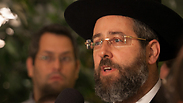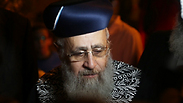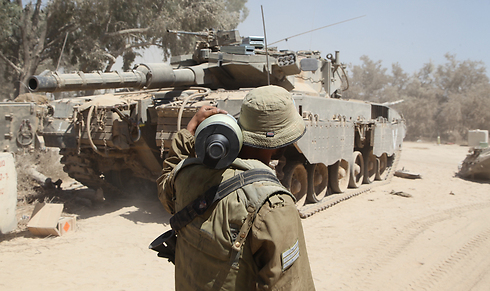
Chief Ashkenazi Rabbi David Lau
Photo: Ohad Zwigenberg

Chief Sephardic Rabbi Yitzhak Yosef
Photo: Motti Kimchi
Israel's Chief Rabbinate has issued a halachic ruling exempting IDF fighters taking part in Operation Protective Edge from fasting during Tisha B'Av,
the annual fast day commemorating the destruction of the First and Second Temples in Jerusalem.
"These days, as IDF soldiers are standing on the frontline and fighting and sacrificing their lives for the Jewish people and the Land of Israel, we hereby declare that according to the Halacha, soldiers on the frontline are exempt from fasting on Tisha B'Av, and all the mourning laws do not apply to them," the rabbis wrote.

The ruling, signed by Chief Ashkenazi Rabbi David Lau and Chief Sephardic Rabbi Yitzhak Yosef, forbids IDF soldiers operating in Gaza to fast this Tuesday.
Protective Edge
Rabbi Levi Brackman
When Israel's young troops sing 'we have no one to rely on other than our Father in Heaven' before entering into battle, it carries on a tradition of thousands of years of Jewish spirit and belief.

IDF forces in Gaza. 'Soldiers working to prevent another destruction must be strong in body and spirit' (Photo: Motti Kimchi)
The letter concluded with a prayer: "May God safeguard their departure and arrival in life and peace, adorn them with the crown of victory, and we shall be able to see comfort of Zion and Jerusalem out of the calm and safety."
'Troops may listen to music during mourning period'
Rabbi Yosef explained that "it's simple and clear that soldiers who are in the midst of fighting are exempt from fasting." He clarified that "even if they want to, they are not allowed to fast and must eat as a mitzvah.
"The Tisha B'Av fast is directed to the destruction of the Temple, and the IDF soldiers who are working to prevent another destruction must be strong in body and spirit as they conduct this mission," the chief Sephardic rabbi added.
The mourning period between the first and ninth day of the Jewish month of Av includes a prohibition on eating meat and drinking wine, as well as on listening to music.
Chief Ashkenazi Rabbi Lau has ruled, however, that religious artists may perform in front of the soldiers in order to cheer them up, "as this helps them embark on the battle with renewed strength, filled with encouragement and hope."















